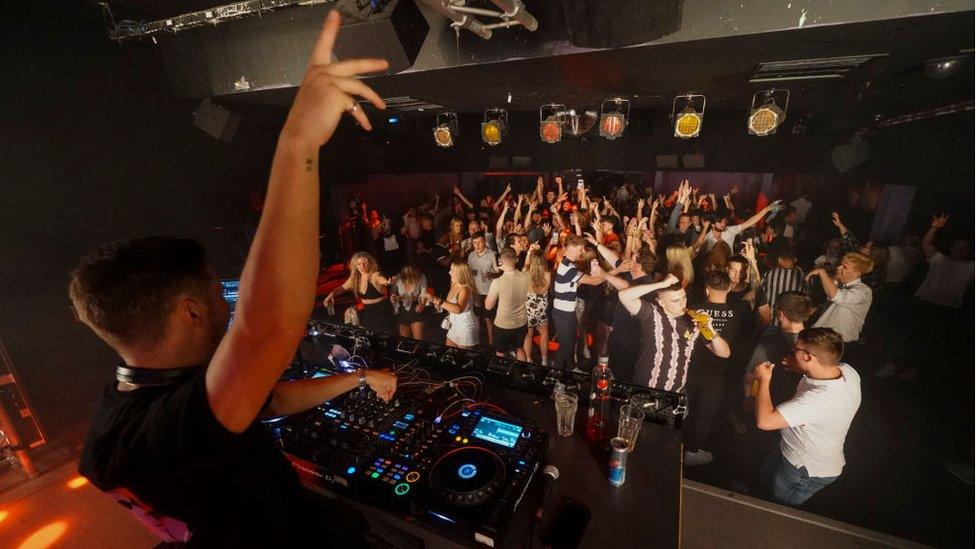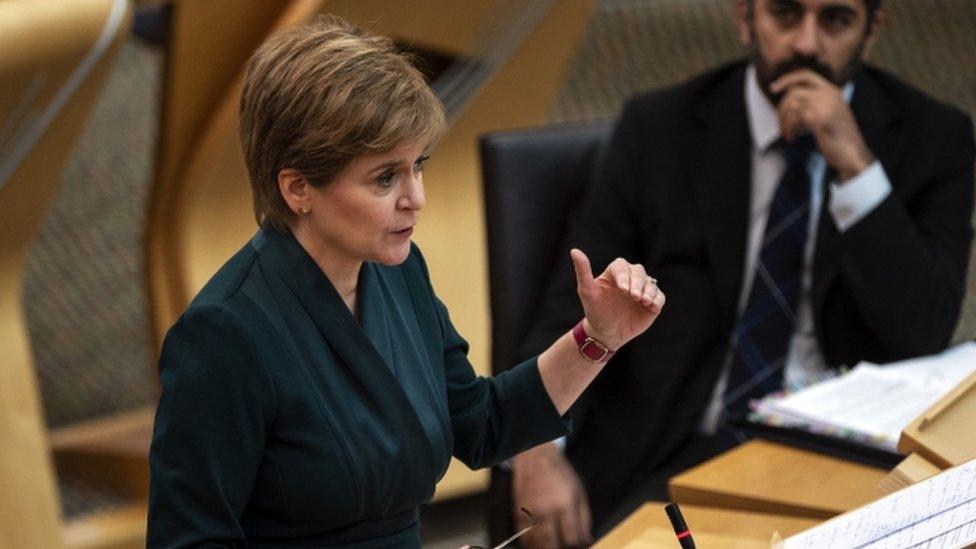Scottish venues told to 'use common sense' on vaccine passports
- Published

Nicola Sturgeon has urged venues to use "common sense" when checking vaccine passports, as she set out details of where and when they will be required.
Major events and venues such as nightclubs will be expected to ensure that everyone present has had two doses of vaccine from the start of October.
However spot-checks will be allowed at larger events, with organisers expected to do a "reasonable number" of checks.
The first minister said the scheme will help reduce transmission of the virus.
And she said it could encourage uptake of vaccines and help keep venues like nightclubs open for business.
Some business leaders voiced concerns that the scheme "goes well beyond what was initially proposed" and could impact on hotels, pubs and other hospitality venues.
Ms Sturgeon told MSPs that Covid-19 cases had fallen in Scotland in recent weeks, but warned that "the position remains fragile" with the NHS under "sustained pressure".
The government's vaccine certification scheme will come into force at 05:00 on 1 October, with people over the age of 18 required to show they have had both doses of vaccine before they will be allowed entry to:
Nightclubs and adult entertainment venues
Unseated indoor live events, with more than 500 people in the audience
Unseated outdoor live events, with more than 4,000 people in the audience
Any event, of any nature, which has more than 10,000 people in attendance
Certificates will be displayed via an app, which will be available for download from 30 September, while venue staff will either scan this using another app or visually check the QR code shown,
The government has drawn up a working definition of a "nightclub" as being a venue which is open between midnight and 05:00, serving alcohol, and which has a designated area for dancing and provides live or recorded music for this purpose.
Ms Sturgeon said detailed guidance would be published, but said venues should use "common sense" over the scheme.
She said a venue which has a dancefloor would not have to check people coming in for a pub lunch in the afternoon, but said "it would be reasonable" to check customers who arrive later in the evening.
The first minister added: "A pragmatic approach will be encouraged, so that businesses can make sensible judgements."

While clubs and smaller events will be expected to inspect the certificates of all customers, the organisers of larger events will have to carry out a "reasonable number" of checks.
Aberdeen nightclub owner and spokesman for the Night Time Industries Association Scotland, Gavin Stevenson, told BBC Radio Scotland's Drivetime programme the definition was still confusing.
"It is not a definition of just nightclubs because it includes about 2,000 pubs and bars across Scotland in addition to the 100 nightclubs that are actual nightclubs.
"It would be fair to say that it has not in any way been communicated well by the Scottish government with only nine days to go until this policy is implemented."
He added: "Typically pubs would have opening hours up until about 01:00 and most of them would have some form of entertainment on at the weekends. This will also apply to lots of city centre circuit bars and to hotel function rooms with parties or events going on in them.
"These venues will now have to take on door staff to control entry when they would previously have had no requirement to do so under their existing licences. There is a critical shortage of door staff and it won't be possible to implement this by 1 October so we have raised our concerns with government on that basis that this is a fundamentally unworkable plan."
Football chiefs had said spot-checks would be "the only practical reality" when dealing with matches involving tens of thousands of fans, warning of lengthy queues and potential for disorder if every attendee was checked.
Ms Sturgeon said there had been talks with football clubs and licensed trade organisations, saying their feedback had been "very helpful".
The Scottish Chambers of Commerce was critical of the plans, with chief executive Liz Cameron claiming "thousands" of businesses would be caught up in the scheme.
She said: "We have made it clear that the practical application of what is being asked is not workable in the timelines being proposed.
"Scotland's economy remains fragile, and many businesses remain in survival mode - there is no doubt that vaccine certifications will serve as an economic detriment."
'Limited engagement'
Opposition parties at Holyrood - which all voted against the plans but saw them approved by MSPs from the SNP-Green administration - also called for greater clarity about the plans.
Scottish Conservative health spokesman Sandesh Gulhane said: "The SNP government vaccine passport scheme comes into force next week, and the first minister is still finalising guidance and businesses are worried about the impact it will have on them.
"Despite promises of a reset, it is clear that jobs and businesses are still not the priority of this government."
Scottish Labour leader Anas Sarwar said detail had been provided "at long last", but the government was still falling short.
He said: "There are still big gaps in the detail, still limited engagement with businesses affected, and limited evidence published of the difference it will make."
Mr Sarwar added that it was "at best disingenuous" to suggest the scheme is the same as one being set up in Wales, where people will have to provide either proof of vaccination or a recent negative test.
Ms Sturgeon said the problem with the Welsh scheme was that it relied on self-reporting of test results, which she said was "not the best approach" and would not drive up the uptake rates of vaccines.